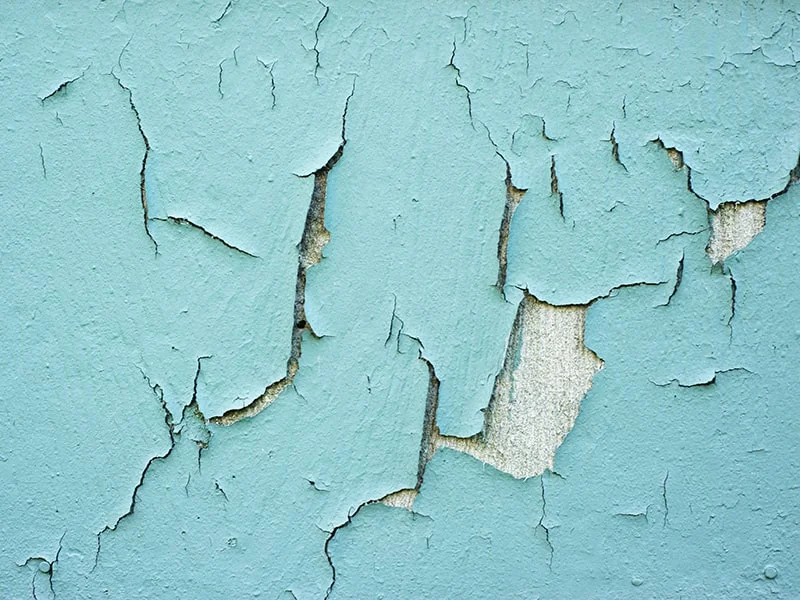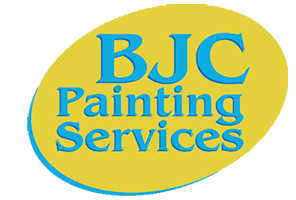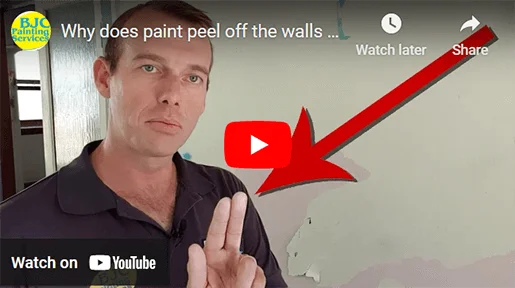Why Does Paint Peel Off The Walls of A House?
- Blog
- Brett

One of the easiest and most cost-effective ways to add value to your house is also one of the simplest – paint. In a home’s interior, it can brighten up a space and create a focal point. When used on a home’s exterior, paint can easily amp up its curb appeal.
Sounds so easy, right? But there are times that things don’t go according to plan and paint just starts to peel off your walls. So why does this happen and what are the signs to look out for?
My paint is peeling! Why?
Several reasons are to be considered on why this happens, even with a fresh coat of paint. These can range from having a dirty wall, utilising the wrong paint combination (latex +oil), to excess moisture and Mother Nature herself. When this happens, it will surely bum you out as you see your hard work and money go to waste!
Aside from making your house unattractive and dull, peeled paint also poses a health hazard. Falling and crumbling paint chips can hurt your eyes while the chalky residue causes skin irritation and allergic reactions. Long-term lung damage can also happen if you are also frequently exposed to paint dust or particles.
Things That Cause Paint to Peel (and what we can do about it)
Improper or Poorly Prepared Surfaces
A poorly prepared or dirty wall surface will ruin your paint job no matter what kind or brand of paint you use. Dirt, contaminants, and uneven surfaces will prevent your paint from properly binding to the wall and result in patches, blotches, and cracks that would eventually cause the paint to oxidize and peel.
To remedy this, it is best practice to properly prepare any surface/walls that need to be painted.
You do this by:
- Cleaning your walls – this means giving your walls a good wash with sugar soap and water (which is recommended by most paint manufacturers) and properly drying it out.
- Getting rid of loose paint – thoroughly remove loose paint with a scraper and wire brush. But before doing so, always check for lead-based paint first before starting any prep work, especially in older houses.
- Using a filler – a good quality filler fills in cracks and holes in your walls to give you a solid surface to paint on. After applying the product, let it completely dry and sand it down for a smooth finish.
- Retexturing – there will be times that you may need to retexture your surface. This is to make sure that your existing surfaces match for a coherent uniform finish.
- Priming – this is an essential step to take, especially if you live in an area that has high levels of humidity. Priming adds protection while ensuring excellent paint adhesion and durability.
Excessive Moisture
High humidity brings about excessive moisture that causes even fresh paint to peel off your walls. Poor ventilation along with daily household activities like cooking, frequent prolonged showering, and using the humidifier causes excessive moisture inside the house.
On the outside, excessive moisture can be caused by clogged gutters, a leaky roof, inadequate caulking, or interior moisture that has managed to seep out or even all of the above.
To make things worse, all the dampness and condensation can also cause mold and mildew issues which is very bad for your health.
You can fix this by:
- Airing out the room or having adequate ventilation
- Make use of specialized paint
Using the Wrong Paint
While paint has a general purpose, you have to use them properly, especially with the many types of paint now available in the market. Before you start painting, it’s very helpful to also know which type of paint works on which type of walls. Using the wrong kind of paint for your walls can cause them to peel almost, making you waste time, effort, and money.
If your area has high humidity, you can solve this by:
- Choosing and using the right primer and paint – the primer preps the walls’ surface and seals any imperfections such as stains that might bleed through while also improving paint adhesion. The paint is there to add protection and a pop of colour.
- Following directions/recommendations – while painting is a relatively easy DIY activity, it pays to follow the expert’s advice to get the most out of your painting project such as using paint that hasn’t expired yet and following the right mix ratios.
The experts here at BJC Painting Services are more than happy to guide you and answer any of your queries. We hope you have found this information helpful!





